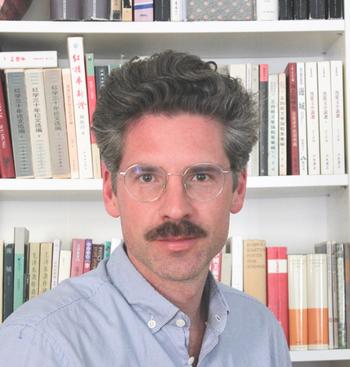Dr. Johannes D. Kaminski

Fellow in the project "Epochal Lifeworlds: Narratives of Crisis and Change"
Short Biography
Johannes D. Kaminski’s research interests are German literature, Chinese classic novels and contemporary global science fiction. He received his PhD in German Studies at the University of Oxford in 2011 with a thesis on Goethe. He was a British Academy Postdoctoral Fellow at the University of Cambridge (2012-2015) and a Postdoctoral Fellow at the Academia Sinica (2015-2017) in Taipei, Taiwan. From 2018 to 2020 he held a Marie Curie Fellowship at the University of Vienna. He is currently based at the Institute of World Literature, Slovak Academy of Sciences. Recent articles include ‘The Neo-Frontier in Contemporary Preparedness Novels’ (Journal of American Studies 55.1, 2020) and ‘Leaving Gaia Behind: The Ethics of Space Migration in Cixin Liu’s and Neil Stephenson’s Science Fiction’ (World Literature Studies 13.2, 2021).
Project
Leaving Earth Behind: The Ecological Imaginary of Contemporary Chinese Fiction / Vom Aufbruch von der Erde: Ökologische Imaginationen in zeitgenössischer chinesischer LiteraturMy project inquires into Chinese-language novels that advance new Grand Narratives in the wake of environmental crises. In these texts, the aim is not to reconnect to a state of nature, but to embrace technocratic visions that hold the promise of a golden future—or to regard human activity as pointless as such. During a time in which the West is discussing the compatibility of environmental goals with the individual freedoms of liberalism, the People’s Republic of China is increasingly advancing its own narrative of Progress. Under the guidance of authoritarian leadership, the country has announced ambitious environmental aims and appears much less alarmed by the prospect of natural degradation.
In contemporary Chinese literature, the rise of the anti-alarmist discourse is evinced by three different text genres:
- The environmental melancholia seen in documentary texts dating from the 2000s has been replaced by more optimistic scenarios.
- Science-fiction texts reiterate the can-do-optimism of American postwar optimism, presenting humanity’s escape into space as a desirable future.
- As magical realism mixes with speculative fiction, depleted landscapes become an emblem of metaphysical emptiness, as Buddhist teachings are invoked to cope with an increasingly uninhabitable world.
